 JOHN RUBIEN -AUTHOR
JOHN RUBIEN -AUTHORLISTEN AS YOU READ FOR THE EXPERIENCE
For a guy who's considered to be one of the four or five greatest trumpet players in jazz history, Freddie Hubbard sure has taken some lumps.
Back in the '70s, when adopting electric instruments and rock stylings earned jazz artists the scarlet "sellout" S - unlike today, when it's a badge of innovation - it seemed Hubbard took the most flak, even though many of his peers were doing it. It was as if a collective "Freddie, say it ain't so!" went up. It's why Hubbard's producer and arranger, trumpeter David Weiss, calls Hubbard the Barry Bonds of jazz.
"He's the one guy who seems to be taking the brunt of the s- for everybody's whatever," Weiss says, "whether it's fusion, irresponsibility, drug use."
Hubbard doesn't get too exercised over it, though.
"They've got to jump on somebody," he says.
Fact is, he's got bigger things to worry about. For example, his own trumpet turned on him. This occurred in 1992, when Hubbard was on a pressure-cooker tour that brought him to New York, Finland and Japan in a single week. At the Blue Note in New York, "I was playing so hard, my lip popped," he says. A blister formed, but instead of taking some time off, Hubbard flew straight to Finland for another gig, and the blister popped onstage.
"Blood was everywhere, man," Hubbard says.
Then the lip became infected. When it failed to heal, a doctor ordered a biopsy. It came back negative, but Hubbard kept trying to play, which wasn't good for his lip or his reputation. Eventually, he slowed down so much it looked as if he was going to cash in his career, at which point, in the late '90s, Weiss rode to the rescue.
"I call him my baby," Hubbard says, chortling heartily. "He brought me back to work. He called me out of the blue and said, 'C'mon, Freddie, you've got to play some more.' "
On April 7, Hubbard turns 70, and he's celebrating with a series of shows Thursday through Saturday at the San Francisco Yoshi's. Four of his band members - vibraphonist Bobby Hutcherson, alto saxophonist James Spaulding, drummer Lenny White and pianist George Cables - have been playing with Hubbard since the '60s, and Spaulding grew up with him in Indianapolis. The other players for the birthday shows are tenor saxophonist Craig Handy, bassist Dwayne Burno and Weiss.
"It'll be good to be back at Yoshi's. I used to play there all the time, But what with my lip, they've been scared to book me," he says, laughing.
Hubbard is speaking by phone from his Sherman Oaks home in Southern California's San Fernando Valley. He's lived in the area since the early '70s, the period of his brightest stardom, when he was putting out big-selling records such as "Sky Dive," "Red Clay" and "First Light," which won a Grammy for the title song.
By then he had already made dozens of records as a leader and played on hundreds of others. He wasn't only the hardest-working trumpeter in show business, he was also the best, with a gleaming, quicksilver sound that combined the brass of Louis Armstrong with the bebop power of Clifford Brown and the melodic grace of Miles Davis.
"Nobody's played longer, higher, harder or faster than Freddie Hubbard, for more years," Weiss says by phone from New York. "Nobody. Not even close. There's nobody you can compare him to."
Hubbard was lucky, of course, to come up in an era where jazz giants not only roamed the Earth, but a lot of them also lived around the corner. That was the '60s, when the Crown Heights section of Brooklyn was something of a mecca for jazz artists.
"I lived with (saxophonist) Eric Dolphy for a year and a half," Hubbard says. "(Pianist) McCoy Tyner lived down the block." He ticks off the name of his neighbors: "(Bassist) Paul Chambers, (pianists) Cedar Walton, Bobby Timmons, Kenny Barron, Wynton Kelly."
The critical mass of these artists and the camaraderie among them are what distinguishes that era from today's, according to Hubbard.
"We would play with each other and study," he says. "I used to go over to somebody's house every day. Sonny Rollins. I would go over to his house and ask him questions, practice with him. Coltrane, too."
Not that it was easy for Hubbard to get accepted by this crowd when he first arrived in New York from Indianapolis in 1958.
"It took about a month before I had a chance to sit in" at the jam sessions, he says "They wouldn't let me. Finally, I just took my horn and walked up on the bandstand."
He made his mark, but paid gigs came slowly at first because, he says, everyone wanted trumpet players to sound like Dizzy Gillespie or Davis.
"I was playing like Clifford, and I met Miles, and he said (Hubbard imitates Davis' raspy growl), 'You like Clifford?' And I said, 'Yeah, I think he's the baddest around.' And Miles said, 'Nah, he plays too much. He's too staccato. He plays too many notes.'
"Then he said to me, 'Freddie, you play too many notes. Ain't nobody can hear all that s-.' But he got me my first gig with Blue Note records."
Hubbard cut about a dozen records for Blue Note, including "Hub Cap" and "Ready for Freddie," and he played on countless classics for the label: Wayne Shorter's "Speak No Evil," Dolphy's "Out to Lunch," Herbie Hancock's "Takin' Off." It wasn't just Blue Note, of course. Hubbard played on John Coltrane's "Ascension," Ornette Coleman's "Free Jazz," Oliver Nelson's "The Blues and the Abstract Truth" and far too many more albums to name.
"As a trumpet player, nobody's been able to do what he can do on the instrument," Weiss says. "It's just ridiculous."
Musicians who hired Hubbard "could expand how they wrote things because they knew Freddie would be able to play them," Weiss adds. "And that makes great records possible."
Now, of course, the spiel on Hubbard is that he's lost his chops. But, Weiss says, "he's still capable of doing things weakened that nobody else can do." For proof, listen to Hubbard's comeback album, "New Colors," released in 2001 on Hip Bop. Backed by Weiss' New Jazz Composers Octet, Hubbard's genius comes through on flugelhorn played on several of his classic tunes. Some of the pyrotechnics are missing from his arsenal, but his sense of melody and rhythm are 100 percent.
Hubbard has another CD with the octet in the can and an all-star date with drummer Louis Hayes, pianist Roland Hanna and bassist Ron Carter due for Blue Note.
"The trumpet is rough, man, especially the way I play," Hubbard says. "I used to play all over the horn, like a saxophone. It takes a little more stamina. I used to play so long ... 30 choruses. People don't do that s- no more."
So, yes, his trumpet struck back at him. Not that he holds it against the instrument.
"I was lucky. I got to play with everybody I wanted to play with. And that trumpet took me all over the world, man. I really appreciate it."
Back in the '70s, when adopting electric instruments and rock stylings earned jazz artists the scarlet "sellout" S - unlike today, when it's a badge of innovation - it seemed Hubbard took the most flak, even though many of his peers were doing it. It was as if a collective "Freddie, say it ain't so!" went up. It's why Hubbard's producer and arranger, trumpeter David Weiss, calls Hubbard the Barry Bonds of jazz.
"He's the one guy who seems to be taking the brunt of the s- for everybody's whatever," Weiss says, "whether it's fusion, irresponsibility, drug use."
Hubbard doesn't get too exercised over it, though.
"They've got to jump on somebody," he says.
Fact is, he's got bigger things to worry about. For example, his own trumpet turned on him. This occurred in 1992, when Hubbard was on a pressure-cooker tour that brought him to New York, Finland and Japan in a single week. At the Blue Note in New York, "I was playing so hard, my lip popped," he says. A blister formed, but instead of taking some time off, Hubbard flew straight to Finland for another gig, and the blister popped onstage.
"Blood was everywhere, man," Hubbard says.
Then the lip became infected. When it failed to heal, a doctor ordered a biopsy. It came back negative, but Hubbard kept trying to play, which wasn't good for his lip or his reputation. Eventually, he slowed down so much it looked as if he was going to cash in his career, at which point, in the late '90s, Weiss rode to the rescue.
"I call him my baby," Hubbard says, chortling heartily. "He brought me back to work. He called me out of the blue and said, 'C'mon, Freddie, you've got to play some more.' "
On April 7, Hubbard turns 70, and he's celebrating with a series of shows Thursday through Saturday at the San Francisco Yoshi's. Four of his band members - vibraphonist Bobby Hutcherson, alto saxophonist James Spaulding, drummer Lenny White and pianist George Cables - have been playing with Hubbard since the '60s, and Spaulding grew up with him in Indianapolis. The other players for the birthday shows are tenor saxophonist Craig Handy, bassist Dwayne Burno and Weiss.
"It'll be good to be back at Yoshi's. I used to play there all the time, But what with my lip, they've been scared to book me," he says, laughing.
Hubbard is speaking by phone from his Sherman Oaks home in Southern California's San Fernando Valley. He's lived in the area since the early '70s, the period of his brightest stardom, when he was putting out big-selling records such as "Sky Dive," "Red Clay" and "First Light," which won a Grammy for the title song.
By then he had already made dozens of records as a leader and played on hundreds of others. He wasn't only the hardest-working trumpeter in show business, he was also the best, with a gleaming, quicksilver sound that combined the brass of Louis Armstrong with the bebop power of Clifford Brown and the melodic grace of Miles Davis.
"Nobody's played longer, higher, harder or faster than Freddie Hubbard, for more years," Weiss says by phone from New York. "Nobody. Not even close. There's nobody you can compare him to."
Hubbard was lucky, of course, to come up in an era where jazz giants not only roamed the Earth, but a lot of them also lived around the corner. That was the '60s, when the Crown Heights section of Brooklyn was something of a mecca for jazz artists.
"I lived with (saxophonist) Eric Dolphy for a year and a half," Hubbard says. "(Pianist) McCoy Tyner lived down the block." He ticks off the name of his neighbors: "(Bassist) Paul Chambers, (pianists) Cedar Walton, Bobby Timmons, Kenny Barron, Wynton Kelly."
The critical mass of these artists and the camaraderie among them are what distinguishes that era from today's, according to Hubbard.
"We would play with each other and study," he says. "I used to go over to somebody's house every day. Sonny Rollins. I would go over to his house and ask him questions, practice with him. Coltrane, too."
Not that it was easy for Hubbard to get accepted by this crowd when he first arrived in New York from Indianapolis in 1958.
"It took about a month before I had a chance to sit in" at the jam sessions, he says "They wouldn't let me. Finally, I just took my horn and walked up on the bandstand."
He made his mark, but paid gigs came slowly at first because, he says, everyone wanted trumpet players to sound like Dizzy Gillespie or Davis.
"I was playing like Clifford, and I met Miles, and he said (Hubbard imitates Davis' raspy growl), 'You like Clifford?' And I said, 'Yeah, I think he's the baddest around.' And Miles said, 'Nah, he plays too much. He's too staccato. He plays too many notes.'
"Then he said to me, 'Freddie, you play too many notes. Ain't nobody can hear all that s-.' But he got me my first gig with Blue Note records."
Hubbard cut about a dozen records for Blue Note, including "Hub Cap" and "Ready for Freddie," and he played on countless classics for the label: Wayne Shorter's "Speak No Evil," Dolphy's "Out to Lunch," Herbie Hancock's "Takin' Off." It wasn't just Blue Note, of course. Hubbard played on John Coltrane's "Ascension," Ornette Coleman's "Free Jazz," Oliver Nelson's "The Blues and the Abstract Truth" and far too many more albums to name.
"As a trumpet player, nobody's been able to do what he can do on the instrument," Weiss says. "It's just ridiculous."
Musicians who hired Hubbard "could expand how they wrote things because they knew Freddie would be able to play them," Weiss adds. "And that makes great records possible."
Now, of course, the spiel on Hubbard is that he's lost his chops. But, Weiss says, "he's still capable of doing things weakened that nobody else can do." For proof, listen to Hubbard's comeback album, "New Colors," released in 2001 on Hip Bop. Backed by Weiss' New Jazz Composers Octet, Hubbard's genius comes through on flugelhorn played on several of his classic tunes. Some of the pyrotechnics are missing from his arsenal, but his sense of melody and rhythm are 100 percent.
Hubbard has another CD with the octet in the can and an all-star date with drummer Louis Hayes, pianist Roland Hanna and bassist Ron Carter due for Blue Note.
"The trumpet is rough, man, especially the way I play," Hubbard says. "I used to play all over the horn, like a saxophone. It takes a little more stamina. I used to play so long ... 30 choruses. People don't do that s- no more."
So, yes, his trumpet struck back at him. Not that he holds it against the instrument.
"I was lucky. I got to play with everybody I wanted to play with. And that trumpet took me all over the world, man. I really appreciate it."


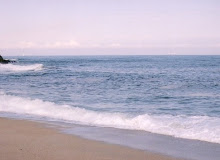





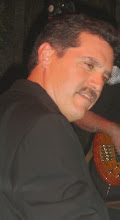





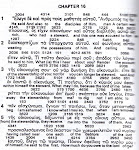

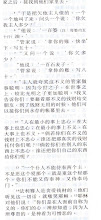









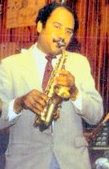







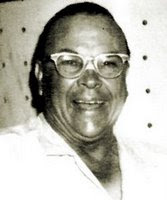







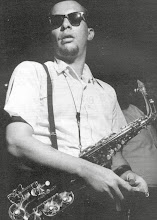

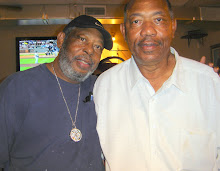


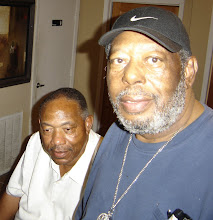













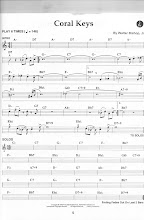

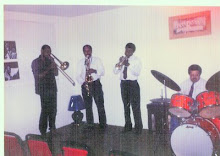






No comments:
Post a Comment